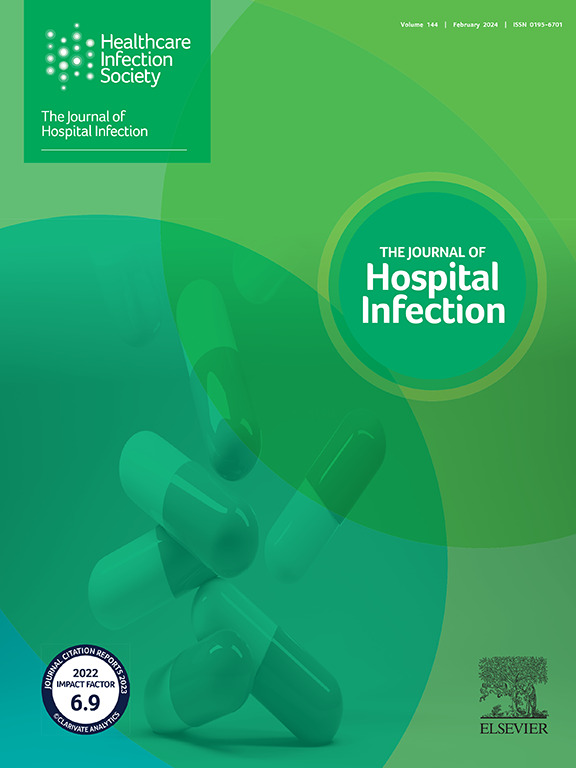旨在支持多重耐药生物(MDROs)携带者的非药物干预措施:系统的文献综述。
IF 3.1
3区 医学
Q1 INFECTIOUS DISEASES
引用次数: 0
摘要
背景:多药耐药生物(mdro)的携带者经常经历耻辱、焦虑和不确定性。许多人感到信息不足,导致痛苦和不满。目的:本系统文献综述旨在评价支持MDROs携带者信息和心理需求的非药物干预研究。方法:按照PRISMA指南,检索2000年1月至2024年10月期间的MEDLINE、EMBASE和PsycINFO。此外,我们进行了全面的引文检索以确定干预措施。对研究特征、干预类型和结果的调查结果进行了叙述性综合,并对报告的实施挑战和考虑因素进行了专题分析。发现:只有四项研究被确定,总共包括238名参与者。所有干预措施都包括教育成分,其中一项还包括情感支持成分。这些干预措施旨在提高MDRO携带者的知识、幸福感和行为结果。教育与知识、感知信息和满意度的提高有关,尽管在行为结果和幸福感方面的发现喜忧参半。实施方面的挑战包括资源限制、融入临床工作流程、可持续性和医疗保健环境中的可变性。结论:本综述的主要结果是对如何解决MDRO携带者的非医疗需求的研究明显缺乏。虽然有限的可用证据表明教育和情感支持干预可能是有益的,但方法上的缺陷限制了这些发现的普遍性。我们的综述强调,迫切需要强有力的、可扩展的、以患者为中心的干预措施,以改善耐多药耐药病毒携带者的体验。本文章由计算机程序翻译,如有差异,请以英文原文为准。
Non-pharmacological interventions designed to support carriers of multi-drug-resistant organisms (MDROs): a systematic literature review
Background
Carriers of multi-drug-resistant organisms (MDROs) often experience stigma, anxiety and uncertainty. Many feel inadequately informed, leading to distress and dissatisfaction.
Aim
To evaluate research on non-pharmacological interventions to support carriers of MDROs with their informational and psychological needs.
Methods
This systematic literature review followed the PRISMA guidelines, and MEDLINE, EMBASE and PsycINFO were searched between January 2000 and October 2024. Moreover, a comprehensive citation search was conducted to identify interventions. Findings on study characteristics, intervention types, and outcomes were synthesized narratively with a thematic analysis of reported implementation challenges and considerations.
Finding
Only four studies were identified, comprising a total of 238 participants. All interventions included educational components, and one also incorporated an emotional support element. The interventions aimed to improve knowledge, well-being and behavioural outcomes among MDRO carriers. Education was associated with improvements in knowledge, perceived informedness, and satisfaction, although findings on behavioural outcomes and well-being were mixed. Implementation challenges included resource constraints, integration into clinical workflows, sustainability, and variability in healthcare settings.
Conclusions
The main outcome of this review is the striking lack of research on how to address the non-medical needs of MDRO carriers. Although the limited available evidence suggests that education and emotional support interventions may be beneficial, methodological shortcomings limit the generalizability of these findings. This review highlights the urgent need for robust, scalable, patient-centred interventions to improve the experiences of MDRO carriers.
求助全文
通过发布文献求助,成功后即可免费获取论文全文。
去求助
来源期刊

Journal of Hospital Infection
医学-传染病学
CiteScore
12.70
自引率
5.80%
发文量
271
审稿时长
19 days
期刊介绍:
The Journal of Hospital Infection is the editorially independent scientific publication of the Healthcare Infection Society. The aim of the Journal is to publish high quality research and information relating to infection prevention and control that is relevant to an international audience.
The Journal welcomes submissions that relate to all aspects of infection prevention and control in healthcare settings. This includes submissions that:
provide new insight into the epidemiology, surveillance, or prevention and control of healthcare-associated infections and antimicrobial resistance in healthcare settings;
provide new insight into cleaning, disinfection and decontamination;
provide new insight into the design of healthcare premises;
describe novel aspects of outbreaks of infection;
throw light on techniques for effective antimicrobial stewardship;
describe novel techniques (laboratory-based or point of care) for the detection of infection or antimicrobial resistance in the healthcare setting, particularly if these can be used to facilitate infection prevention and control;
improve understanding of the motivations of safe healthcare behaviour, or describe techniques for achieving behavioural and cultural change;
improve understanding of the use of IT systems in infection surveillance and prevention and control.
 求助内容:
求助内容: 应助结果提醒方式:
应助结果提醒方式:


